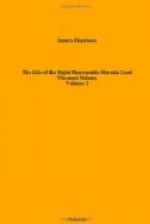An intellectual tempest, at this apparently enviable period of our hero’s glory, was violently agitating the secret recesses of his too susceptible heart. Justly jealous of honour, his soul ever kindled with alarm at the most remote idea of aught that could, by any possibility of implication, be considered as having the smallest tendency to sully or impair a single particle of that celestial inheritance which he felt conscious of having a legitimate right to possess in undiminished lustre, If it should be thought, by the more calmly philosophical mind, that he might sometimes too soon take the alarm; let it, at least, not fail to be remembered, that the true votary of honour must never be, even once, a single moment too late.
The reader who has attentively perused the preceding part of Lord Nelson’s history, will long since have discovered, that one grand trait of character, in this exalted man, was a determined resolution of accomplishing, to it’s fullest possible extent, the business, whatever it might be, which was once committed to his charge; and that, in every expedition, it formed his chief pride, to effect even more than could have been expected, by those who had, from the greatest possible confidence in his skill and ability, selected him for the enterprise. It was this invariable principle that, by prompting him to serve on shore, at the batteries before Calvi, cost him the vision of an eye; and it was to this same cause, that he owed the loss of his arm at Teneriffe. Conformably to this grand characteristic, having so honourably received the Earl of St. Vincent’s orders to seek and to destroy the French armament, which he had at length gloriously encountered at the mouth of the Nile; he still internally regretted, that the wound on that occasion received in his forehead, by rendering him almost wholly blind, had proved the sole cause of a single French ship’s escape. Not that this undoubted conviction in his own bosom, that he should certainly have captured or destroyed the whole fleet, conveys the smallest reflection on any other officer for not having effected the same purpose: for, most assuredly, though many captains in this noble squadron might boast of equal bravery with himself, and of much skill too, Lord Nelson greatly surpassed them all, and perhaps every other naval commander, in that promptitude of vigorously winged imagination which instantaneously rises to the exigency. The moment Captain Berry had, on first beholding the position of the French fleet at anchor, fully comprehended the entire scope of his adored admiral’s design for the attack, he exclaimed, in an extacy—“If we succeed, what will the world say?”—“There is no if in the case,” coolly replied the admiral: “that we shall succeed, is certain; who may live to tell the story, is a very different question!” So positive was this great man of success, even before the battle commenced.




